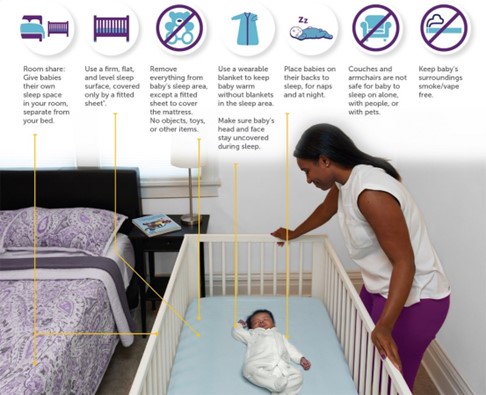The nurse is preparing to discuss safety with a group of parents of infants. When planning the program, which topics would be most important to include: (Select Al That Apply)
Bicycle safety
Drug and gun safety
Use of blankets, pillows, and stuffed animals in the crib
Correct placement of car seats
Never leaving infant unatended in the bathtub
Correct Answer : C,D,E
- Use of blankets, pillows, and stuffed animals in the crib: It is important to educate parents about the risk of suffocation associated with soft objects in the crib. Infants should always sleep on their back in a crib with a firm matress and no loose bedding or soft objects.
- Correct placement of car seats: Properly installed car seats can help prevent serious injury or death in the event of a car accident. It is important to teach parents how to properly install car seats and use them correctly.
- Never leaving infant unatended in the bathtub: Drowning is a leading cause of death in young children, and infants can drown in just a few inches of water. It is important to remind parents to never leave their infant unatended in the bathtub, even for a moment.
Therefore, options c, d, and e are the most important topics to include when discussing safety with parents of infants. Options a and b may be important topics to discuss with older children, but they are not relevant to infants.

Nursing Test Bank
Naxlex Comprehensive Predictor Exams
Related Questions
Correct Answer is D
Explanation
Atrial fibrillation is a common arrhythmia, and diuretics are often used in the management of patients with this condition to help control fluid balance. However, diuretics can cause electrolyte imbalances, especially hypokalaemia (low potassium levels), which can lead to muscle cramps and other complications.
A Complete Metabolic Panel (CMP) is a blood test that measures various electrolytes, glucose, and other important components. Among the options given, the most likely lab value to be abnormal in Patient MK's case is a low level of potassium (K+), which is consistent with her symptoms and diuretic use. Option d, K+ -
-
- mEq/L, is the correct option as it represents a low level of potassium, which is defined as a value less than 3.5 mEq/L.
Option a, Mg2 – 20 mEq/L, represents high magnesium levels, which are not typically associated with diuretic use or muscle cramps. Option b, Na+ - 123 mEq/L, represents low sodium levels, which are less likely to occur with diuretic use, and are typically associated with other conditions. Option c, Ca2 – 10.0 mg/dl, represents normal calcium levels and is not typically affected by diuretic use.

Correct Answer is C
Explanation
A PICC line is a long, thin tube that’s inserted through a vein in your arm and passed through to the larger veins near your heart 1. If the PICC line is touching a chamber of the heart, it is most likely touching the right atrium 2.

Whether you are a student looking to ace your exams or a practicing nurse seeking to enhance your expertise , our nursing education contents will empower you with the confidence and competence to make a difference in the lives of patients and become a respected leader in the healthcare field.
Visit Naxlex, invest in your future and unlock endless possibilities with our unparalleled nursing education contents today
Report Wrong Answer on the Current Question
Do you disagree with the answer? If yes, what is your expected answer? Explain.
Kindly be descriptive with the issue you are facing.
